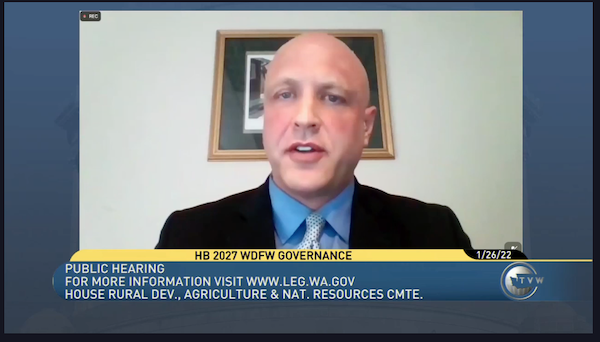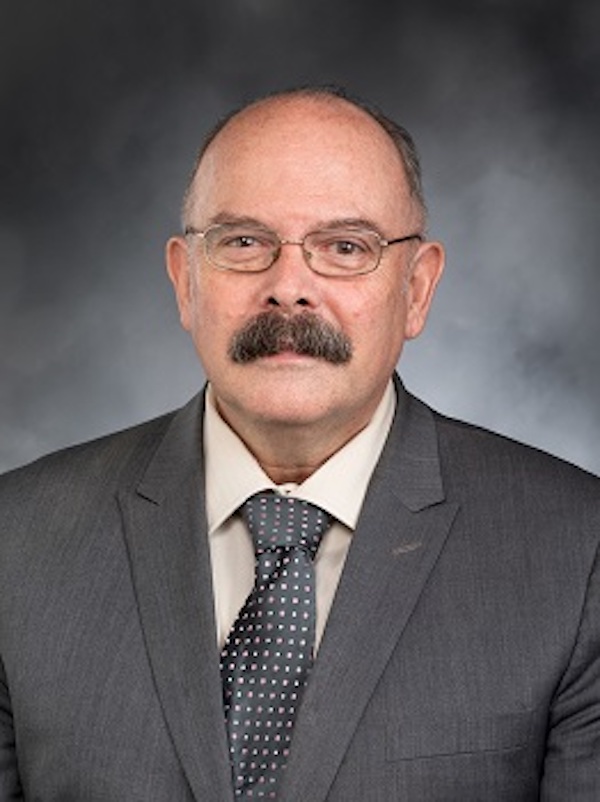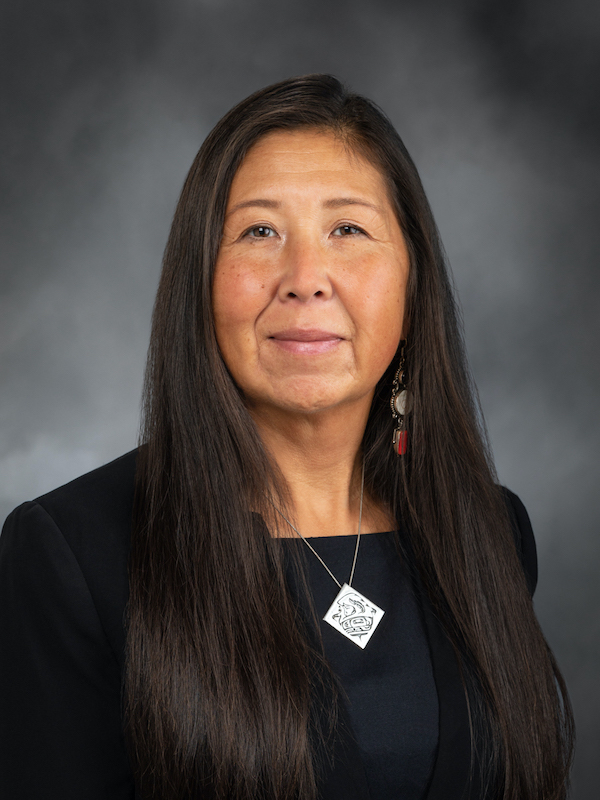It’s all WDFW and Fish and Wildlife Commission, all the time – or at least that’s what it’s apparently meant to seem like in Olympia these days, and here we are perpetuating the vicious cycle.
But for the record and to continue our previous reporting of what’s facing the agency and board, this morning saw state lawmakers mull the creation of a task force to come up with new WDFW governance options, study tweaking or ditching the commission, and review both bodies’ statutory mandates to preserve Washington’s critters and maximize hunting and fishing opportunities, and then report back to the legislature by the start of next winter.
Prime sponsor Rep. Joe Fitzgibbon, a Central Sound Democrat, described House Bill 2027 as “an acknowledgement that what we have isn’t working,” during a public hearing before the House Rural Development, Agriculture & Natural Resources Committee.

He said the commission’s origins in 1995’s Referendum 45, which also gave the governor-appointed citizen panel the authority to hire and fire WDFW’s director, were meant to depoliticize decision-making around the agency, “and I don’t think that that’s working.”
“I think that if anything, the conflict at the commission have hyperpoliticized some of the really difficult decisions that really should be based in science and based in public input, not based in factions and politics,” he said.
Fitzgibbon said there has been increasing concern about the commission’s ability to manage such an “important” state department, but that he himself wasn’t trying to influence Columbia River fishery policies or predator management. He added that he was glad Governor Jay Inslee had appointed three new members on Monday.
Those appointments from the Governor’s Office came 451 days after the term of a Westside member ended but who was kept onboard without an official reappointment, 389 days without a required third Eastside member and 39 days after an at-large commissioner resigned, all of which helped lead to November’s tie vote on the 2022 spring black bear hunt proposal and last Friday’s 4-3 revote essentially to restart rule-making for it, with no small amount of fomenting, pot-stirring and agitation simmering in the background.
As written, HB 2027 would create a special board made up of 15 legislative appointees, anglers, hunters and others from the state fish and wildlife world, along with recreation and local government representatives, who would be tasked with:
“Reviewing options to restructure or eliminate the Fish and Wildlife Commission”;
“Recommending options for a new governance structure of the Department of Fish and Wildlife”;
“And reviewing the statutory mandate of both the Department and the Commission.”
“The task force must report its findings to the appropriate committees of the Legislature by December 1, 2022.”
Other bill sponsors include Reps. Mike Chapman, who chairs the House committee, and Steve Tharinger, a fellow Olympic Peninsula Democrat.
Just as they supported three commission-related bills heard yesterday before a state Senate natural resources committee, the Northwest Sportfishing Industry Association, Northwest Marine Trade Association and Coastal Conservation Association gave the House bill a thumbs up.
Paula Swedeen of Conservation Northwest and a veteran of WDFW’s relatively successful Wolf Advisory Group, which was led by a third-party neutral, supported it too and said the task force would need to be “well facilitated in order to ensure civil and genuine dialogue.” The need for a facilitator was echoed by Trina Bayard of Audubon Washington, which otherwise was an “other” on the bill.

Eric Olson, the WDFW Sergeants Union Chief Steward, said given sergeants’ wide interaction with the public, his organization should have a seat on the task force.
Supporting the bill, Trout Unlimited’s Alexei Calambokidis said the panel’s single fish conservation position should be split into freshwater and saltwater seats.
And while also calling for farmer and rural voices to be represented, Tom Davis said the Washington Farm Bureau had signed in as “con” to the bill in the sense it had “concerns” rather than out and out opposition, though by some of his statements it was a pretty fine line.
“For the distant observer, this bill may appear to be innocent enough, but beneath the surface our concerns are that there’s a significant storm brewing over species management and the very mandate of the department. And please remember that the work the department does is complicated and, frankly, it’s messy. Managing fish and wildlife in their habitats is an attempt to manage a nearly unmanageable force. Sometimes it works; sometimes it doesn’t,” Davis said. “That doesn’t mean the department has failed in all cases. And I say that as someone who is a frequent critic of the department and commission, but at the end of the day, frankly, I think it all works.”

At the same time, Davis said that “additional” legislative oversight on appointments could help and possibly “depoliticize” those who get on board.
Two commission-related bills in the Senate aim to modify how commissioners can be brought on board and removed, essentially strengthening the upper chamber’s hand in the joint process with the governor, while a third would stuff WDFW and its citizen panel under the elected Commissioner of Public Lands. The third is a bigger lift, but lawmakers were looking at merging the other pair to get them out of committee in early February.
Ron Garner of Puget Sound Anglers and a member of Inslee’s orca task force said he understood lawmakers’ frustrations with WDFW, and offered to help to protect fishing and hunting if the bill went forward, but said he also wished it wouldn’t.
“The commission does work, it does its job. The framework has not been broken. What’s been broken is the implementation and lack of commissioners,” Garner said.
And Connie Gallant of the Olympic Forest Coalition noted that while the Governor’s Office had slacked off on naming new commissioners, so too had the Senate in not confirming all who are serving. She said the House should recommend the upper chamber do so, and it shouldn’t study the elimination of WDFW or its citizen panel because it is “truly not in the best interest of those who depend on you.” Instead, the commission should be left to “clean house, so to speak.”
Wednesday night, Mark Pidgeon of the Hunters Heritage Council said the task force bill might have had potential “if the regulated user groups were contacted to work” on it, but otherwise was opposed to the “terrible” legislation. He said HHC is also “strongly” and “vehemently” opposed to the bills consolidating WDFW under the lands commissioner and requiring the governor to come up with a new commission appointment if a member isn’t confirmed by the Senate within 12 months of being seated, respectively.
Pidgeon also said his hunting-rights organization was monitoring and had no position on the fourth commission bill that would bar members from serving without appointment and allow House and Senate leadership to appoint new reps if the governor doesn’t do so within 60 days of a vacancy.

After the public testimony on the task force bill, Rep. Joel Kretz, a Northeast Washington Republican who owns a horse ranch in a remote portion of Okanogan County, said he has had dealings with Fish and Wildlife Commission members over the years and he wondered why they don’t get paid.
“You’ve got a board that is putting in an incredible amount of time in, and what we’ve done, I think, with the structure is, it’s extremely demanding on time,” Kretz said. “I’ve talked to commissioners back in the ’90s who felt like they lost hundreds of thousands of dollars of income because they were in private sector business and they had to take a lot of time off from their jobs. I think we need to do something about that.”
Technically, commissioners are reimbursed $100 per workday, which is defined as official meetings or chair-assigned duties, plus travel expenses, but the lawmaker’s point was that there’s far more to it than attending meetings over Zoom.
That’s one thing that’s been impressed into me in all this reporting on the commission, just how much of a monster time suck serving really is. Former chair Larry Carpenter, a retired Mount Vernon boat dealer, described his and the vice chair positions as being “full time jobs +.”
Kretz said he’s seen a “huge erosion” in the ability of those impacted by wildlife and management decisions therein being able to serve, and that when he’s tried to recruit what he considered to be qualified, interested people, he’s been told, ‘”I just can’t afford to put in that kind of time.'”
Most commissioners are retired professionals or are retired but working part-time, such as several years ago with Jay Kehne of Conservation Northwest (the organization stated his commission role at the time was “entirely independent” of his job with them). But then there’s Molly Linville who runs a Douglas County cattle ranch. She was voted into the vice chair role in December and then thrust into the chair’s seat earlier this week on an interim basis with Carpenter’s dismissal by the Governor’s Office.

Kretz’s advocacy for individuals over organization staffers on the commission, as well as better pay for them, drew support from Rep. Debra Lekanof, an Anacortes area Democrat and Swinomish Indian Tribal Community member, who also suggested the bill look at how the commission could be diversified.
“How do we bring it back to the people who fish, who hunt, who understand how wildlife and fisheries impact the economy of Washington state?” Lekanof asked. “I don’t think we all realize, but in 2013 when WDFW did an economic assessment on commercial fisheries, Mr. Chairman, and on recreational fisheries, it brings in $6 billion alone to the General Fund to Washington state and 60,000 jobs.”
A WDFW press release from that year states, “Spending by fishers, hunters, and wildlife watchers generates more than $4.5 billion annually for the state’s economy and supports about 60,000 jobs.”
“And I know when my daughter catches a little fish over in Eastern Washington, she’s the happiest little girl, and when she gets a deer over there when she’s bowhunting, she’s a tough little girl. So we value what we potentially could do with this great agency. Thank you, Rep. Fitzgibbon, for bringing it forward,” Lekanof stated.
Today’s hearing was an early step in HB 2017 potentially becoming law. As with those three aforementioned bills in the Senate, deadline to get this one out of committee and heard on the floor of the House is February 3. An alternate route is for the task force bill to be tacked into the supplemental budget as a proviso.
And that, believe it or not, is all the time I have for today’s WDFW/Commission watch.
Editor’s notes: Updated 7:55 a.m., Thursday, January 27, 2022, with the positions of the Hunters Heritage Council on HB 2027 and SBs 5656, 5661 and 5721.
Updated 6:45 a.m, January 28, 2022, to put a finer point to HHC’s opposition to HB 2027 – “terrible.”



